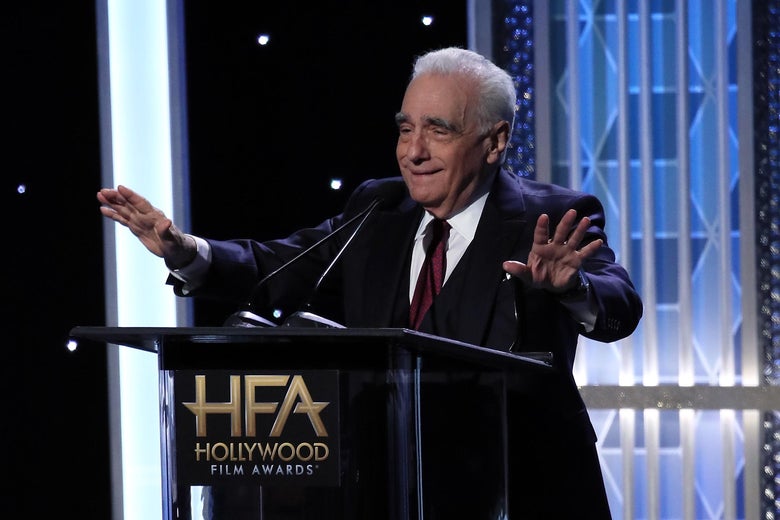

Hold on, let me explain!
David Livingston/Getty Images
Since early October, the film world has been arguing about Martin Scorsese’s thoughts on Marvel movies, based on a brief answer he gave in an Empire magazine interview in which he compared the films to theme parks said he did not consider them cinema. The discussion had a certain amount of Kremlinology to it: Scorsese only said a few words on the matter, leaving more room for projection than a movie palace, and so a lot of different issues were being conflated in the responses from both Scorsese’s New Hollywood peers and Marvel fans and filmmakers. On Monday, Scorsese published an op-ed in the New York Times hashing out exactly what he was trying to say. It’s a beautifully written, melancholy look at the state of the industry, and although it’s unlikely to change many minds, it should reduce the number of people talking past each other. Read it, read it, read it.
It’s a generous essay in one sense: Scorsese goes out of his way to acknowledge that taste isn’t subject to dispute, going so far as to say that if he had been born later, he could imagine enjoying Marvel movies. He also interrogates his own taste as a young man, acknowledging that some of his favorite films—Alfred Hitchcock’s in particular—promised and delivered some of the same theme park thrills Marvel traffics in. But he thinks Marvel is different, and he shows his work, proceeding backwards from “I do not enjoy watching these movies” to the industrial processes that produced them.
Many of the elements that define cinema as I know it are there in Marvel pictures. What’s not there is revelation, mystery or genuine emotional danger. Nothing is at risk. The pictures are made to satisfy a specific set of demands, and they are designed as variations on a finite number of themes.
They are sequels in name but they are remakes in spirit, and everything in them is officially sanctioned because it can’t really be any other way. That’s the nature of modern film franchises: market-researched, audience-tested, vetted, modified, revetted and remodified until they’re ready for consumption.
Revelation, mystery, and genuine emotional danger are where you find them, but it’s hard to argue with the way Scorsese characterizes Marvel movies as business ventures built-to-order for a specific purpose. You could say the same thing about the overwhelming majority of Hollywood product, but Scorsese also explains why he isn’t just letting people like things: The scale and cost of a Marvel film requires it to play on as many screens as possible, there are a finite number of movie theaters, and the resulting crush is relegating other types of movies—the ones Scorsese likes to watch and make, for instance—to streaming and home video. That is a real thing that is happening, it is distinct from “I don’t like watching superhero movies,” and it’s something we should be able to talk about without getting into an argument about whether there’s a line between “worldwide audiovisual entertainment” and “cinema,” and if so, where to draw it. (It’s also distinct from “I wanted The Irishman to play in more theaters,” as he explains.) To be clear, Scorsese isn’t backing down from the argument part of this, and this gets Disney dead to rights, given the way they’re locking down the Fox library:
… there are some in the business with absolute indifference to the very question of art and an attitude toward the history of cinema that is both dismissive and proprietary—a lethal combination.
The debate over whether or not Hollywood studios are making good movies at the moment has been raging since 1911, and it’s not going to end any time soon. But going forward, at least we have some clarity about what Scorsese thinks about Marvel movies.
https://slate.com/culture/2019/11/martin-scorsese-on-marvel-mcu-new-york-times-op-ed-not-cinema.amp
2019-11-05 06:49:00Z
Bagikan Berita Ini














0 Response to "Martin Scorsese Explains What He Was Trying to Say About Marvel Movies - Slate"
Post a Comment